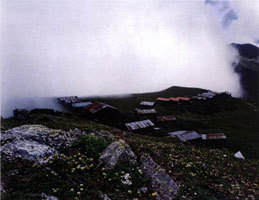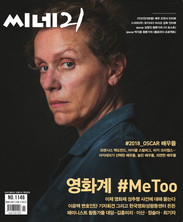영화제를 찾아가는 일을 여전히 보람있게 해주는 것은 발견의 즐거움이다. 최근에 본인에게 그런 발견의 즐거움이 또 있었다. 지리적, 문화적으로 아시아와 유럽에 걸쳐 있고, 세계에서 가장 오래되고 매력적인 도시 중 하나인 이스탄불에서 말이다.
23년 전 이스탄불국제영화제가 시작했을 당시만 해도 군사정권 아래 터키는 꽤 규모있는 상업영화 산업을 갖고 있었다. 연간 제작편수는 70년대에 TV에 자리를 빼앗겨 200편 이하로 줄어들어 있었다. 그러나 일마즈 귀니나 제키 외크텐 같은 좌파감독들이 이끄는 ‘대안적인’, 더 예술적인 경향의 영화가 등장하기 시작하여 진지하게 지방과 노동자들의 생활을 비추었다.
서구 영화제는 이들 영화를 너무나 좋아했다. 거칠고 투박한 아름다움을 지닌 풍광 속에 ‘이국적인’ 농촌생활을 보여주면서도 서양 예술영화의 공식에 충실했고, (한층 더해서) 터키 정부의 탄압을 받는 경우가 많았기 때문이다(같은 시기 중국에서도 유사한 영화를 몇편 만들어내고 있었다). 말하자면 아시아 예술영화가 서양에 도착한 것이었고, 용감한 작가들은 자유를 사랑하는 서구 세계의 지지를 받을 수 있었던 것이다. 같은 시기 터키 상업영화 산업은 비디오 출현에 심각한 타격을 받았고 그뒤로 회복되지 못했다. 현재 제작편수는 연간 8∼15편밖에 안 되고 그 가운데 소수의 작품이 국제영화제에서 상영되곤 한다.
올해는 이름있는 두명의 감독인 예심 우스타올루와 제키 데미르퀴뷔즈가 신작을 들고 나타났다. <구름을 기다리며>(Waiting for the Clouds)(사진)와 <대기실>(The Waiting Room)이었는데, 두 작품 모두 준수한 정도에 그쳤고 활기와 참신함이 떨어졌다. 대신 가장 놀라운 사건은 49살 무명감독의 처녀작이었다. 이 감독은 이스탄불에서 동남쪽으로 200km 떨어진 마을에서 태어나 여전히 그곳에 살고 있다. 아흐멧 울루자이(Ahmet Ulucay)의 <수박껍질로 만든 배>(Boats out of Watermelon Rinds)는 60년대 중반 시골 소도시의, 영화와 여자들에 미친 두 소년에 대한 반자전적인 영화이다. (불행히도) 비디오로 찍어 필름으로 옮겨진 이 영화는 모든 출연진의 연기가 고르고 편집이 매끄러워 크나큰 매력을 발산한다.
또 이 영화는 외국인들의 ‘이국취향’에 영합하지 않고 당시의 실제 농촌생활에 바탕을 두고 있다. 이 점에서는 자의식 강한 80년대 예술영화보다는 60년대, 70년대 정통 터키 상업영화에 더 가깝다. 이 작품은 이스탄불영화제 국내 경쟁부문에서 최우수상을 탔다.3년 전, <비죈텔레>(Vizontele)라는 인물 중심 코미디가 70년대 중반 어느 마을에 텔레비전(‘비전텔레’)이 들어오면서 생기는 변화를 그리면서 350만명이라는 믿기 어려운 숫자의 관객을 끌어모았다. 이에 못지않게 재미있는 속편 <비죈텔레 투우바>(Vizontele Tuuba)는 지난해 200만명 이상 보았다. 그리고 최근에는 <학교>(School)가 개봉해서 젊은 터키 관객층을 대상으로 하는 터키 최초의 학원공포물이 되었다. 터키만의 방식대로 터키만의 관객을 재발견하면서, 터키 영화계는 뭔가 확연히 꿈틀거리고 있다. 그리고 그런 발전에 동참하고 놀라워하는 일은 정말 즐겁다.
The pleasure of discovery is what makes going to film festivals still worthwhile. For me, it happened again recently - in Istanbul, one of the world's most ancient, stunning cities that geographically and culturally has always straddled Europe and Asia.
When the Intl. Istanbul Film Festival was founded 23 years ago, Turkey still had a large commercial film industry and the country was run by a military-supervised government. Annual production, eaten away by TV during the '70s, was down to less than 200 features a year. But there were the beginnings of a "alternative," more artistic cinema, led by leftist directors like Yilmaz Guney and Zeki Okten, that focused on rural and working-class life in a serious way.
Western festivals loved these movies: they showed "exotic" peasant life in ruggedly beautiful landscapes, obeyed western rules of art cinema, and (even better) were often banned by the Turkish government. (At the same time, China was also making a small number of similar films.) Asian art cinema had "arrived," and its brave filmmakers could be championed by the freedom-loving West.
At the same time, Turkey's commercial film industry was being clobbered by the arrival of video, and never really recovered: production is now between 8-15 features a year, a small number of which show at international festivals.
This year, two name directors, Yesim Ustaoglu and Zeki Demirkubuz, had new films - "Waiting for the Clouds" and "The Waiting Room." But both proved to be only respectable, lacking vigor and freshness. Instead, the big surprise was a first feature by an unknown, 49-year-old filmmaker who still lives in the village he was born in, 200 kilometres southeast of Istanbul.
"Boats out of Watermelon Rinds," by Ahmet Ulucay, is a semi-autobiographical movie about two boys, obsessed with film and girls, in a country town during the mid-'60s. Shot (unfortunately) on video, but transferred to film, it's beautifully played by the whole cast, smoothly edited and has buckets of charm.
It's also based in real rural life of the period without pandering to foreign tastes for "exoticism." In this respect it's closer to oldstyle Turkish commercial cinema of the '60s and '70s than the self-consciously arty movies of the '80s. The film deservedly won Best Film in the Istanbul festival's national competition.
Three years ago, "Vizontele," a character comedy about the impact of TV ("vision-telly") on a village in the mid-'70s, drew an incredible 3.5 million admissions; the sequel, the equally enjoyable "Vizontele Tuuba," drew more than 2 million admissions last year. And recently released was "School," the country's first college-slasher movie, specifically tailored to young, local viewers.
Something is definitely stirring in Turkish cinema as it rediscovers its own audience on its own terms. And it's a pleasure to share in, and be surprised by, such a development.



